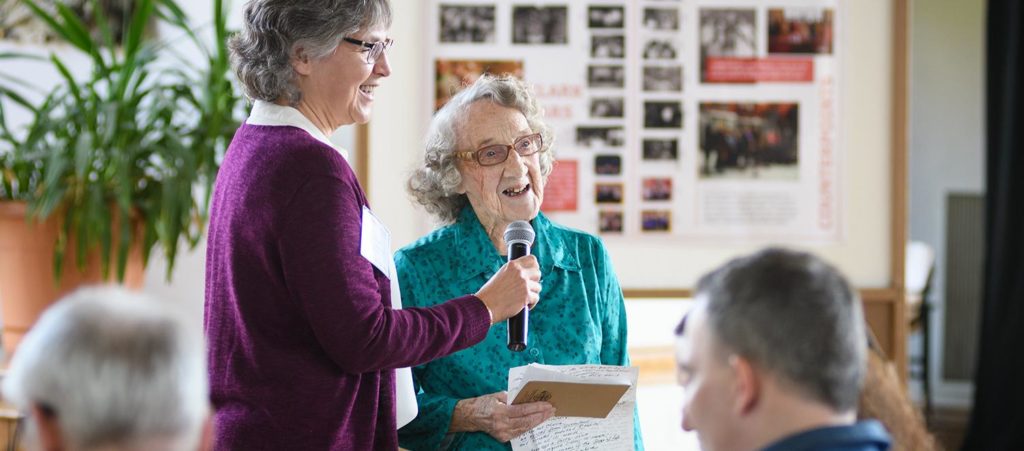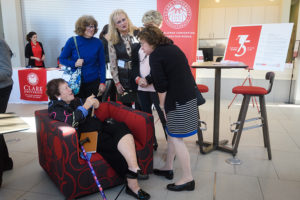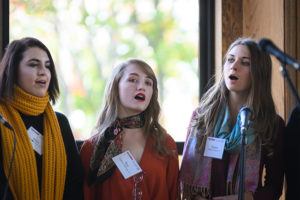Clark celebrates a special milestone

Elyse Darefsky ’79, co-chair of “Celebrating 75 Years of Co-ed Clark,” stood before a Tilton Hall audience of Clark University women and greeted them with a simple message: “Welcome home.”
Those two words drew hearty applause from attendees at the Oct. 28 event commemorating Clark’s admitting its first women undergraduates in 1942. The day featured lively panels about Clark women’s contributions to the community, their activism and their impact on the field of geography. Professor Emerita Sharon Krefetz, along with former dean Marcia Savage ’61, M.A.Ed. ’62, Ed.D. ’66, L.H.D. ’92, participated in a keynote conversation.

Women across generations gathered Saturday morning in the Shaich Family Alumni and Student Engagement Center to sign in for the day’s events and connect with one another. Jane Gasek ’58, who majored in chemistry at Clark, said she benefited from strong academics and attentive mentors but found the work world far less hospitable after she graduated. One company rejected her because its offices had “dirty pictures on the walls.” Another said no because it was not equipped with a women’s bathroom. An oceanographic institute she applied to flatly told her, “Women are bad luck on ships.”
Gasek eventually landed a job at Natick Laboratories, a military research complex. She went on to a long career teaching middle school science in Northboro, Mass., where she encouraged the girls in her classes to pursue science studies. “You have to get to them early, or it’s too late,” she said.
A panel about community involvement featured Imogene Winkleman ’15, New York area regional adviser for NFTY, the Union for Reform Judaism’s youth movement; Meghan Rosa ’06, M.A.T. ’07, an English teacher at University Park Campus School; and Micki Davis, director of community engagement at Clark’s LEEP Center. They spoke about their experiences empowering young women and men to be thoughtful, engaged participants in their communities and leaders in their chosen areas.
Read more about the celebration of Clark women
View a photo gallery of the day’s events
Savage, sitting in the audience, said she was pleased to see multiple generations of accomplished Clark women on the panel and in the room. Clark’s community involvement through the years, she noted, would not have been possible without administrators supporting these initiatives and having the courage to say, “Let’s go with it.”
“I’m thrilled to know these people are still here,” she said.
At the Tilton Hall luncheon, President David Angel described as “magical” the experience of seeing generations of Clark women return to campus.
“The passion, commitment and enthusiasm in this room is very tangible,” he said. “I want to thank all of you for your commitment in making Clark an outstanding institution that is forward-thinking and that is willing to be on the forefront of issues that matter in our community and in our society.”

Darefsky, who co-chaired the celebration committee with Jodie Reiskind ’83, enumerated many ways Clark women have brought a spirit of change to campus over 75 years, including agitating for the relaxation of strict curfews and dress codes, leading Vietnam War and civil rights protests, establishing and shaping the first women’s studies program, and spearheading efforts to create a more inclusive campus and raise the University’s social conscience.
“This is all part of our history, and it resonates with each of us,” Darefsky said. “It isn’t so much that Clark shaped its women graduates, it’s that they shaped Clark.”
Featured speaker Irma Frey Stevens ’47 (pictured at top with Darefsky) received a standing ovation before she spoke a word. It would not be the last time she brought the Tilton Hall audience to its feet.
She read her original poem, “The Fundamental Thing as Time Goes By,” and told stories that recalled the “superior education” she received at Clark from legendary professors like Rudolph Nunnemacher in biology and Loring Holmes Dodd in English. She was coxswain on the women’s rowing ream, studied Spanish, French and German, and rode in rumble seats on jaunts through Worcester. Her daily commute from Clinton, Mass., included a walk from the Worcester City Hall bus stop to campus, and back to City Hall for the trip home. The day Franklin Delano Roosevelt died, the buildings along Main Street were draped in black, and the street was eerily silent, she remembered.
Hazel Hughes, the benevolent yet rules-conscious dean of women, once called Irma into her office. “She let me know that she’d observed me chewing gum in the gym,” Stevens said, drawing laughs from the audience. “I would tell the coeds of today, if you’re ever called into the dean’s office, you can say, ‘Well at least I never chewed gum in the gym.’”
Stevens became a teacher in her 50s, earned her master’s degree at 65, and volunteers at Clark’s American Language and Culture Institute. She noted that her son (whom she named Clark in honor of her alma mater), retired at age 68 as an editor with The Los Angeles Times. “He thinks I should retire, too,” she quipped.
The lunch concluded with performances by Clark’s a cappella groups The Clark Bars and the all-female The Counterpoints.


